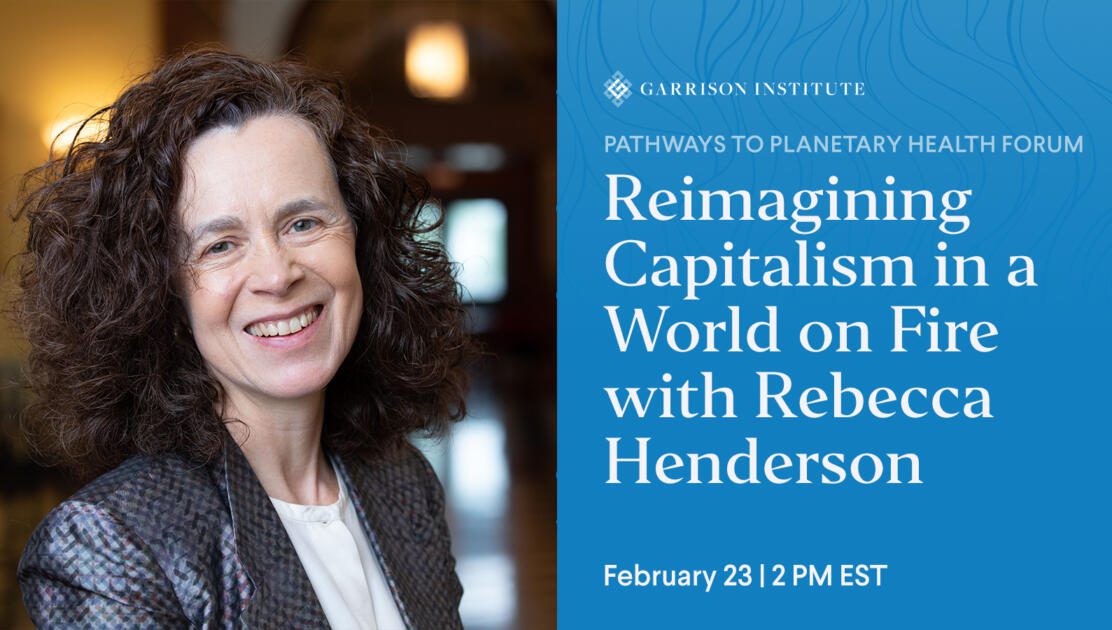Reimagining Capitalism in a World on Fire with Rebecca Henderson
According to Harvard University professor Rebecca Henderson, capitalism is the most successful economic system in history, yet it’s in danger of destroying itself – and our world. While some may be paralyzed by the enormity of the task facing humanity, Henderson’s 2020 book Reimagining Capitalism in a World on Fire offers hope: if you, as an individual, can make even a single company a better place to work, you can change lives and be part of a driving the larger social and political changes that are needed. Henderson joined Garrison Institute co-founded Jonathan F.P. Rose on February 23 for a Pathways to Planetary Health forum to discuss this topic.
Early in the forum, Rose asked Henderson how leaders, in a time of biodiversity loss, climate change, systemic racism, political polarization and growing income inequality, can create the conditions where confronting these problems is beneficial for the organizations.
“I saw often that it wasn’t the CEO or the divisional president [creating the conditions], it was the person two levels down making a nuisance of themselves in a polite and constructive way,” answered Henderson. “By doing things differently, or introducing inconvenient data that was actually driving change.”
She offered an example from her book about Unilever, a British multi-national company that reported over £60B in revenue in 2022. While Paul Polman, their CEO from 2009 to 2019, receives the credit for their turn toward sustainability, lower level people in the company were the ones who had to push for change.
“I talk about a guy named Michael Lennox, who was in the tea business,” she said. “He decided the only way to decommodify the tea business was to embrace sustainability, and he was pushing that agenda. He was met with some success and lot of challenges… I would rather reframe the question as: how do we change the conditions so we all start thinking about change?”
Rose went on to ask Henderson if she sees a process where “taking disparate pieces and weaving them into a holistic pattern… in a world where the forces of profit and materialism are so overwhelmingly powerful that a lot of individual efforts need to be connected if they’re going to have countervailing power” can happen.
Henderson said that there is evidence that “purpose-driven capitalism and sustainable business” have moved from fringe issues to becoming mainstream.
“When I first started talking about these issues, my colleagues thought I had lost my mind,” she said. “Years later, [one of them] said ‘Rebecca, sorry about that, you were right. Climate change is a problem, and so was inequality, and so was race, and yes, business should do something about it.’ I do see change, and I see much more openness among the students I work with to have these conversations. But I do not have a master plan on how to catalyze this at scale across global society.”
After a conversation that touched on spiritual revival, alternatives to Western thought, and meeting people where they are, Henderson and Rose discussed how to repair the great political split that has occurred.
“The answer… is love,” said Henderson. “I’m an economist and engineer, and I feel so odd saying that in public, but it’s true – humans are deeply values-driven. We’ve lost sight of it, and at root we all want what’s best for our children… this old way of being is so embedded in us. ‘I want to tell you how I’m great at math and thermodynamics, to show that I’m a serious person, because serious people don’t talk about love.’ That thinking has to change. I think love is the answer, and we absolutely have to rediscover that.”
____________________________________________________________________
This interactive online event was part of a continuing series in the Garrison Institute’s Forum on Pathways to Planetary Health (PPH). Pathways to Planetary Health explores the moral, ethical, and human behavioral dimensions of the search for regenerative solutions, including Half-Earth, Regenerative Economics, Ecological Civilization, and The Common Good.
